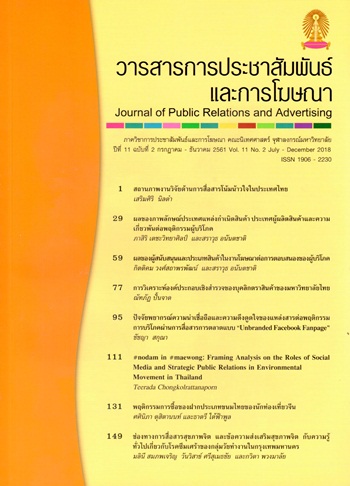The Status of Persuasive Communication Research in Thailand
Main Article Content
Abstract
The objectives of this research aims to examine the development of persuasive communication researches with regards to the problems, communication contexts, concepts and theoretical frameworks, research methodology and body of knowledge which were conducted in Thailand from 1980 to 2017. Documentary analysis was conducted. The documents examined were theses and independent studies of Communication Arts, Journalism, Mass Media Communications, Communication Technologies, and communication contexts from both state and private universities. The findings of the study are as follows:
1.Thereare 327 persuasive communication researches in Communication Arts both at state and private universities from 1980 to 2017. In the 36 years span, the volume of the studies has been increasing gradually and significantly in numbers especially from the state university.
- The most studied problem issue is campaigning on persuasive and persuasive outcome, and quality and accountabilityof persuasive respectively, while the media strategy and effectiveness are less likely to be conducted.
- Persuasive communication contexts were found most in Mass Media Communications followed by interpersonal or group communication researches.
- Research frame works of these studies relied on communication theories and message receiver respectively.
- Research methodology implemented in persuasive communication research are likely to be equal in both quantity and quality research by number of the studies as there were more than one method per studies. In-depth interview is found most in those studies, followed by survey and qualitative content respectively, while action research was found least.
- The body of knowledge indicated variation or factors of the dominated source, designed strategy, media launch, and receiver factors all impacted the persuasive achievement.

